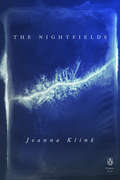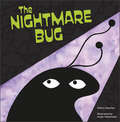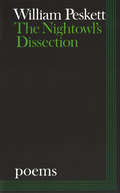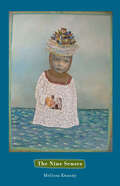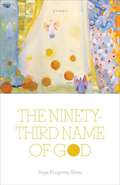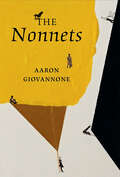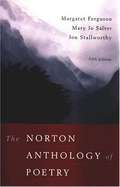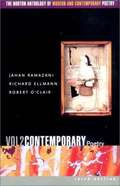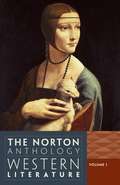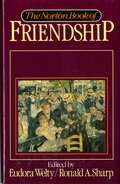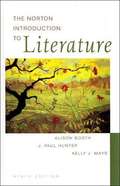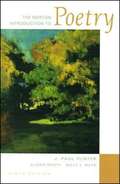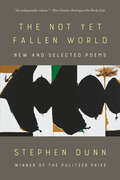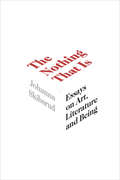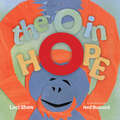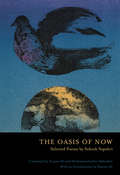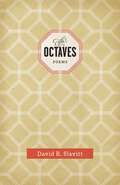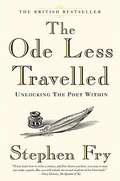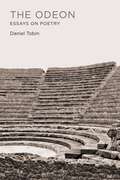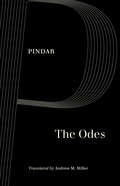- Table View
- List View
The Nightfields (Penguin Poets)
by Joanna KlinkA new collection from a poet whose books "are an amazing experience: harrowing, ravishing, essential, unstoppable" (Louise Glück)Joanna Klink's fifth book begins with poems of personal loss--a tree ripped out by a windstorm, a friendship broken off after decades, the nearing death of parents. Other poems take on the cost of not loving fully, or are written from bewilderment at the accumulation of losses and at the mercilessness of having, as one ages, to rule things out. There are elegies for friends, and a group of devotional poems. The Nightfields closes with thirty-one metaphysical poems inspired by the artist James Turrell's Roden Crater, an extinct volcano in Arizona that Turrell has been transforming into an observatory for the perception of time. The sequence unfolds as a series of revelations that begin in psychic fear and move gradually toward the possibility of infinitude and connection.
The Nightingale (Rigby PM Plus Non Fiction Ruby (Levels 27-28), Fountas & Pinnell Select Collections Grade 3 Level Q)
by Hans Christian AndersenWhen a nightingale flies into the palace gardens, the king is so enchanted by her song that he places her next to his throne. But one day, the king receives a gift - a bird made of gold. Dazzled by its beauty, he begins to ignore the nightingale.
The Nightmare Bug
by Hillary DaecherThrough a relatable experience, The Nightmare Bug empowers children to overcome nightmares Beware! The Nightmare Bug is creeping into dreams again . . . He's been around sleep for many, many years, turning magical dreams into things we all fear. But not tonight! Discover how one small child decides to take control of their nightmares and tackle the Nightmare Bug once and for all. With the help and comfort of the child's mother, along with friends Blankie, Bear, and Rhino, the child drifts off to sleep feeling empowered and ready to show the Nightmare Bug there is nothing to be afraid of in the night. Skipping through dreams of oceans, giants, and the moon, the child, along with the stuffed friends, searches for the Nightmare Bug. When they finally encounter the Nightmare Bug and show the bug the power of what love can do, will the Nightmare Bug disappear forever? The Nightmare Bug is a powerful message designed to identify and tackle the emotions that bad dreams evoke, and to provide coping methods for children who suffer from nightmares on a regular basis. Perfect for SEL curriculums, the back matter includes conversation starters and expert tips for children upon waking from a bad dream, plus tips for parents to help their child cope with a nightmare.
The Nightowl's Dissection
by William PeskettWilliam Peskett belongs to the brilliant generation of young poets from Northen Ireland who broke through in the 1970s. The intent observation and delicate structure of his poems are unusual. They feel their way into situations with both tact and exactness, and move with equal poise through human relationships and the natural world. William Peskett's work appeared in periodicals and on the radio, and it attracted special attention when a group of poems appeared in Faber's Poetry Introduction 2.The Night Owl's Dissection is his first full-length collection of poetry.
The Nine Senses
by Melissa KwasnyThe prize-winning author of Thistle shares “a quietly magnificent collection of prose poems” that explore how we connect to the world around us (Orion).Drawing inspiration from the work of Rene Char, Melissa Kwasny presents a new kind of prose poem in The Nine Senses. These experiments challenge the way we read sequentially, making each line equal to the next as disparate figures and topics appear side by side: Dylan Thomas, Roman water lines, Paul Celan, Shirin Neshat, anti-depressants, Buddhism, William Carlos Williams, Trakl, cancer, Beckett, Pound, Breton, the Iraq War, telekinesis, clairvoyance, Jaune Quick-to-See Smith, and Yeats, among many others.Through it all, Kwasny asks how we tie ourselves to the world when our minds are always someplace other than where we are? As bromides and aphorisms degrade, we are left with startling new realizations. Obliquely touching on the cancer of a friend, her own troubled relationship with her father, and the break-up of a nearly thirty-year partnership, Kwasny also questions mortality, temporality, and eternity. Kwasny then abandons abstraction with some very direct poems about her own cancer and diagnosis.
The Ninety-Third Name of God: Poems (Walter Lynwood Fleming Lectures in Southern History)
by Anya Krugovoy SilverAnya Krugovoy Silver’s debut collection considers the flawed and gaudy flesh as it turns toward a beloved’s embrace, toward the surgeon’s knife. Her poems both celebrate the sensual world and seek to transcend the body’s limitations through encounters with art, memory, and the divine. At once imagistic, lyrical, and meditative, Silver’s verse begins in the personal sphere and then looks outward toward the wider human experiences of illness, faith, fear, and love. From chemotherapy to doing laundry, from observation of deformed pussy willows to contemplation of the word “girl,” Silver does not shrink from life’s “blazonry of loss.” Instead, she ultimately affirms the possibility of praise and joy.
The Nonnets
by Aaron GiovannoneCompulsively confessional and cracking-wise, The Nonnets is an utterly unique alchemy of poetry and comedy.Aaron Giovanonne's latest collection is a book-length sequence of 'nonnets'--nine-line poems that Giovannone handles with ruthless dexterity. Capturing transformations from first dates to goodbye texts, from mama's boy to unrepentant shoplifter, from post-industrial downtown to eleventh-century Italian monastery, these poems present a kaleidoscopic world that careens wildly between despair and ecstasy.
The Norton Anthology Of Poetry (Fifth Edition)
by Jon Stallworthy Mary Jo Salter Margaret FergusonThe Fifth Edition retains the flexibility and breadth of selection that has defined this classic anthology, while improved and expanded editorial apparatus make it an even more useful teaching tool.
The Norton Anthology of Afro-American Literature
by Henry Louis Gates Jr.2,500 pages of poetry, essays, stories and drama.
The Norton Anthology of Modern and Contemporary Poetry (3rd edition)
by Jahan Ramazani"The most acute rendering of an era's sensibility is its poetry," wrote the editors in their preface to the first edition.
The Norton Anthology of Western Literature
by Pericles Lewis Suzanne Conklin Akbari Barbara Fuchs Martin Puchner Wiebke Denecke Caroline Levine Emily WilsonThis edition of The Norton Anthology of Western Literature provides a generous collection of the Western literary tradition in a format that will suit the needs of instructors and students encountering that tradition for the first time. This Ninth Edition represents a thoroughgoing, top-to-bottom revision of the anthology that altered nearly every section in important ways. The book provide instructors and students with several supplements to make the study and teaching of Western literature an even more interesting and rewarding experience.
The Norton Book of Friendship
by Eudora Welty Ronald A. Sharp"Friendship" is celebrated in this collection of poems, essays, stories, sonnets, letters and memoirs by a variety of great writers.
The Norton Introduction to Literature (Ninth Edition)
by Alison Booth Kelly J. Mays J. Paul HunterThe Norton Introduction to Literature is a collection of the very best classic and contemporary stories, poems, and plays, in a flexible and inviting format that accommodates many different teaching styles, reading tastes, and pedagogical needs. The Ninth Edition offers two new contextual chapters, a completely rewritten section on writing about literature, refreshed pedagogy throughout the book, many new student-writing samples, and 60 new literary selections.
The Norton Introduction to Poetry (9th Edition)
by Alison Booth Kelly J. Mays J. Paul HunterIt not only sharpens students' close-reading skills and deepens their appreciation for the emotional power of poetry, but also connects poetry to the larger world by providing a thorough introduction to poetry's authorial, cultural, and critical contexts.
The Not Yet Fallen World: New And Selected Poems
by Stephen Dunn“An indispensable volume.” —Ron Charles, Washington Post Book Club A radiant celebration of Pulitzer Prize–winning poet Stephen Dunn’s enduring oeuvre. Hailed as "indispensable" (David Wojahn), Pulitzer Prize–winning poet Stephen Dunn masterfully shifts between the metaphysical and the ironic, never wavering in his essential honesty. His graceful poems confront our contradictions with tenderness and wit, enliven the ordinary with penetrating observation, and alert us to the haunting wonders and relationships that surround us. The Not Yet Fallen World draws from all nineteen of Stephen Dunn’s crystalline volumes, including his most recent, Pagan Virtues (2019); the National Book Critics Circle Award Finalist Loosestrife (1996); and the Pulitzer Prize–winning Different Hours (2000). By turns sardonic and profound, Dunn examines the disguises we don to hide from ourselves and reveals sublime beauty hidden within seemingly mundane interactions. Nine new poems extend the poet’s inquiry into the paradoxes of contemporary life; as he writes in "Love Poem Near the End of the World," "Something keeps me holding on / to a future I didn’t think possible." Arranged to further Dunn’s signature themes—mortality, morality, and the roles we play in the essential human comedy of getting through each day—this final collection captures the breadth of an acclaimed poet’s achievement. His legacy is a poetic expanse suffused with fearless generosity and perceptive wisdom.
The Nothing That Is: Essays on Art, Literature and Being
by Johanna SkibsrudRather than making "something" out of "nothing," what follows is an endeavour to express the potential of language and thought to encounter what is infinitely beyond both yet to be imagined.In The Nothing That Is, Johanna Skibsrud gathers essays about the very concept of "nothing." Addressing a broad range of topics—including false atrocity tales, so-called fake news, high-wire acts, and telepathy, as well as responses to works by John Ashbery, Virginia Woolf, Anne Carson, and more—these essays seek to decentre our relationship to both the "givenness" of history and to a predictive or probable model of the future.The Nothing That Is explores ways in which poetic language can activate the possibilities replete within our every moment. Skibsrud reveals that within every encounter between a speaking "I" and what exceeds subjectivity, there is a listening "Other," be it community or the objective world.
The Oasis of Now
by Kazim Ali Sohrab Sepehri Mohammad Jafar MahallatiSohrab Sepehri (1928-1980) is one of the major Iranian poets of the 20th century. His verses are often-recited in public gatherings and lines from them were used as slogans by protesters in 2009. A painter, wood-worker, and poet, Sepehri wrote these poems after journeys through Japan, China, and India, where he was exposed to various cultural arts and spiritual disciplines.
The Oasis of Now: Selected Poems (Lannan Translations Selection Series)
by Sohrab SepehriSohrab Sepehri (1928-1980) is one of the major Iranian poets of the 20th century. His verses are often-recited in public gatherings and lines from them were used as slogans by protesters in 2009. A painter, wood-worker, and poet, Sepehri wrote these poems after journeys through Japan, China, and India, where he was exposed to various cultural arts and spiritual disciplines.
The Ocean, the Bird, and the Scholar
by Helen VendlerOne of our foremost commentators examines the work of a broad range of English, Irish, and American poets. Helen Vendler's essays, book reviews, and occasional prose from the past two decades, taken together, are an eloquent plea for the centrality--in humanistic study and modern culture--of poetry's subversive, sustaining, and demanding legacy.
The Octaves: Poems
by David R. SlavittAn accomplished poet and a keen observer of the human condition, David Slavitt deploys both skills to create the whimsical, insightful, and witty poems of The Octaves. In these graceful but often blunt, slyly humorous eight-line poems, Slavitt notes the passing of decades and the loss that entails, the questions that arise when studying works from ancient Greece, and the paradoxes found in philosophy, art, and even the common cold.
The Ode Less Travelled
by Stephen FryComedian and actor Stephen Fry?s witty and practical guide, now in paperback, gives the aspiring poet or student the tools and confidence to write and understand poetry. Stephen Fry believes that if one can speak and read English, one can write poetry. In The Ode Less Travelled, he invites readers to discover the delights of writing poetry for pleasure and provides the tools and confidence to get started. Through enjoyable exercises, witty insights, and simple step-by-step advice, Fry introduces the concepts of Metre, Rhyme, Form, Diction, and Poetics. Most of us have never been taught to read or write poetry, and so it can seem mysterious and intimidating. But Fry, a wonderfully competent, engaging teacher and a writer of poetry himself, sets out to correct this problem by explaining the various elements of poetry in simple terms, without condescension. Fry?s method works, and his enthusiasm is contagious as he explores different forms of poetry: the haiku, the ballad, the villanelle, and the sonnet, among many others. Along the way, he introduces us to poets we?ve heard of but never read. The Ode Less Travelled is not just the survey course you never took in college, it?s a lively celebration of poetry that makes even the most reluctant reader want to pick up a pencil and give it a try. .
The Odeon: Essays on Poetry
by Daniel TobinThe Odeon, a new volume of essays by the celebrated poet and critic Daniel Tobin, takes its title from the classical Greek and Roman buildings designed for the presentation of musical and poetic compositions. Organized around the question of “sensibility”—with its various social, philosophical, and aesthetic connotations—the collection presents a sequence of related essays exploring both resonances and dissonances in the traditions of modern and contemporary poetry. Although Tobin surveys a broad spectrum of works—ranging from John Donne and Emily Dickinson to writers from the twenty-first century such as Mark Doty, Louise Glück, and Carl Phillips—his emphasis remains on details of poetic practice, technique, metaphysical outlook, and artistic aspiration.What most informs these essays is Tobin’s own practice as a poet, his own sensibility, which is at once eclectic and yet very much calibrated to matters of what one theologian termed “ultimate concern.” The Odeon offers an incisive foray into the state of the art of poetry in our time.
The Odes
by PindarOne of the most celebrated poets of the classical world, Pindar wrote odes for athletes that provide a unique perspective on the social and political life of ancient Greece. Commissioned in honor of successful contestants at the Olympic games and other Panhellenic contests, these odes were performed in the victors’ hometowns and conferred enduring recognition on their achievements. Andrew M. Miller’s superb new translation captures the beauty of Pindar’s forty-five surviving victory odes, preserving the rhythm, elegance, and imagery for which they have been admired since antiquity while adhering closely to the meaning of the original Greek. This edition provides a comprehensive introduction and interpretive notes to guide readers through the intricacies of the poems and the worldview that they embody.
The Odes of Horace: A Translation
by Horace David FerryDavid Ferry, the acclaimed poet and translator of Gilgamesh, has made an inspired translation of the complete Odes of Horace, one that conveys the wit, ardor and sublimity of the original with a music of all its own.The Latin poet Horace is, along with his friend Virgil, the most celebrated of the poets of the reign of the Emperor Augustus, and, with Virgil, the most influential. These marvelously constructed poems with their unswerving clarity of vision and their extraordinary range of tone and emotion have deeply affected the poetry of Shakespeare, Ben Jonson, Herbert, Dryden, Marvell, Pope, Samuel Johnson, Wordsworth, Frost, Larkin, Auden, and many others, in English and in other languages. This ebook edition includes only the English language translation of the Odes. As Rosanna Warren noted about Ferry's work in The Threepenny Review, "We finally have an English Horace whose rhythmical subtlety and variety do justice to the Latin poet's own inventiveness, in which emotion rises from the motion of the verse . . . To sense the achievement, one has to read the collection as a whole . . . and they can take one's breath away even as they continue breathing."
